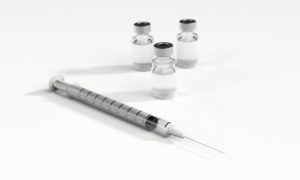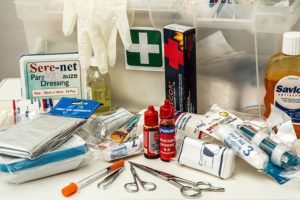Being a tour operator is no easy task — you’re either working in the field, taking thrill-seekers around to different places, or working at your desk, planning trips and taking orders. While doing this job is amazing and rewarding, it can get stressful and overwhelming at times. That’s why it’s so important to stay healthy; if you aren’t physically and mentally fit, it will have a very negative impact on your client satisfaction and your personal confidence, subsequently hurting your business (potentially). In this article, we will be exploring a checklist you can use to ensure you’re healthy while doing your awesome job.
1. Health/Medical Insurance
Don’t be lax when it comes to insurance. Many policies cover a large percentage of mishaps and protect you from losing all your money in case anything goes wrong with your health. If there’s no universal health insurance in your country, try to sign up with a reputable local insurance company.

2. Vaccination
Research common illnesses related to your travel location and talk about it with your doctor. According to the CDC, it is good to review your vaccination status(opens in a new tab) six weeks prior to your journey. This is because it takes some time for the body to develop immunity after vaccination.
The CDC has divided vaccinations into three categories: routine, recommended, and required. In the recommended category, for example, are the vaccines for yellow fever, malaria, and hepatitis. The CDC lists all vaccines according to the country of travel on their website(opens in a new tab).
3. Health Check-Up
Visit your doctor before embarking on a new tour just to check that you’re in top shape. Make sure to do some research done, like blood work and routine urine tests. Check your nutritional status and note where you have deficiencies. You could start taking supplements, like multivitamins, iron, and calcium. If you chronically suffer from any illnesses or have suffered from an illness recently, talk to your doctor about it. Get treated accordingly or carry your appropriate medicines in a medical kit.

4. Medical Kit
Your medical kit should contain emergency as well as routine medications and equipment. Your team and the guests on your tours will absolutely appreciate the safety precautions!
Breathlessness, nausea, diarrhea, constipation, cough, leg cramps, backaches, fatigue, and fever are some of the most common problems that you or your guests may face.
A smart medical travel bag should contain the following:
- Prescription medicines
- Painkillers – ibuprofen/aspirin, mefenamic acid for pain related to periods
- Antimicrobials – antibiotics (amoxicillin-clavulanic acid), antifungal (fluconazole)
- Fever – paracetamol
- Anti-allergic – levocetirizine
- Decongestant
- Digestive system medications – loperamide, ORS and probiotics for diarrhea, laxatives for constipation, proton pump inhibitors and antacids for vomiting
- Antihistamine for motion sickness
- Hand sanitizer
- Feminine hygiene products – tampons, pads
- Condoms/emergency oral contraceptives
- Antiseptic ointment
- Cough suppressant – dextromethorphan
- Sting relief – cream, tablets, or wipes
- Accidental aid – crepe bandage, medical tape, gauze, cotton, antiseptic solution, band-aids, needles
- A pulse oximeter(opens in a new tab) and blood pressure monitor
- Hot water bag (electrical)
- Glucometer with strips for measuring blood sugar
5. Dealing with Jet Lag
Jet lag is not a permanent issue. It has a good prognosis and will disappear in 2-4 days. Symptoms include fatigue, insomnia, irritability, bloating, and nausea… Though we’re sure you’d rather avoid dealing with these symptoms! Try to sleep as much during your travel so that you wake up fresh at your destination. You could use melatonin supplements up to 5 mg for 2-3 days to induce sleep and regularize your sleep schedule.
6. Safe Food and Water Consumption
Avoid eating very heavy meals. Do your best to eat larger portions of vegetables and smaller portions of meat. Eating a lighter fare will keep you more energetic and prevent bloating. Make sure you have washed your hands, too! Avoid consuming local water, too many soft drinks, and liquor. Make sure you purchase enough bottled water to keep you hydrated and carry water with you when possible. It could be convenient to use water purification tablets depending on the availability of drinking water.
7. Preventing Sunburn
You can enjoy sunbathing to get that dusky tan, but try not to get roasted. Make sure you have applied sunscreen on all exposed parts of your body about half an hour before exposure. Remember to reapply after a relaxing swim! Try to avoid going directly in the sun between 11AM and 3PM. If it’s unavoidable, you could wear a wide brimmed hat, UV protective sunglasses, and clothing that covers your skin.
8. Camping Tips
Your body must already have good endurance for camping. Keep up with regular exercises and running in your normal routine, both of which have plenty of benefits. This will reduce your chance of fatigue. Keep insect repellents and mosquito nets handy during camping. In case you are to going areas with high malaria breakouts, carry anti-malarials.
As a final tip, don’t overdo any sort of recreational and unsafe sexual activities. Make sure you sanitize well and stay hygienic.
Find this article useful? Enter your details below to receive your FREE copy of 95 Epic Places To List Your Tours and receive regular updates from Tourism Tiger and leading industry experts.
By submitting this form, you agree to Tourism Tiger contacting you via email.